Faith Communities, Social Relationships and Health
 A few years ago a study came out that showed that social relationships–the human connections that we share with other people–have a powerful influence on our health. The study, Social Relationships and Mortality Risk by Julianne Holt-Lunstad, Timothy B. Smith, and J. Bradley Layton found that having low levels of social interaction had the same impact on mortality rates as being an alcoholic, was more harmful than not exercising and twice as harmful as obesity.
A few years ago a study came out that showed that social relationships–the human connections that we share with other people–have a powerful influence on our health. The study, Social Relationships and Mortality Risk by Julianne Holt-Lunstad, Timothy B. Smith, and J. Bradley Layton found that having low levels of social interaction had the same impact on mortality rates as being an alcoholic, was more harmful than not exercising and twice as harmful as obesity.
Other studies have found similar results. One study showed that people who answered “no” to the question “Do you have anyone who loves and cares for you” had a three to five times higher risk of death and disease than those who answered “yes.” Women with breast cancer who participate in support groups live on average twice as long as those who don’t.
Public health and the social sciences know about this phenomenon at the community scale. They call it social cohesion or social capital and are able to track the correlation between the quality of a community’s social environment—do people trust each other, do people know the names of children on their block, are people able to work together across differences—and the overall health status of people in the community.
This seems like an opportunity for people of faith to take the lead in impacting the health of their communities. In most of religious traditions, there are practices and teachings that support community building and deeper human connection. People come together for religious services, to learn, to celebrate, to support each other in times of crisis or grief. It’s not always pretty, but we deliberately take on some of the most difficult and critical issues in human relationships—forgiveness, accountability, hospitality for the stranger, redemption, sacrifice. We have a great pool of wisdom from millennia of wrestling with what it means to live in community with each other.
This study’s researchers found that the number of people who say they have no confidant tripled over the past 20 years. We know we have an obesity crisis in this country, but we also have a crisis of social isolation that may be even more critical. I’m curious about what faith communities are already doing to build community and social connections, not only for their own members, but in the larger community. What might it look like for us, people of faith who carry this deep knowledge about creating human community, to help build this in the communities we serve?



